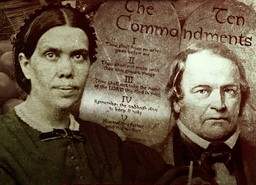Repent ye therefore, and be converted, that your sins may be blotted out, when the times of refreshing shall come from the presence of the Lord... Acts 3:19
"For Calvinists, their Five Points' yardstick controls all aspects of
their soteriology.
--Their understanding of the utter depravity of
mandkind rests on their notion of original sin and, thus, the companion
doctrine that all men and women are born sinners.
--Their only explanation
for the sinfulness of mankind was simply to declare that we all are
sinners because Adam sinned.
-- Because of their controlling "sovereignty
of God" principle, mankind could not possibly have free will and thus
any responsibility.
-- If anyone were to be "saved," it would have to be
due to God's sovereign choice, not man's response.
*Therefore, for the Calvinist, if Jesus is man's Savior, He would have to die for those who are already elected to be saved.
*Therefore, for the Calvinist, if Jesus is man's Savior, He would have to die for those who are already elected to be saved.
Further, our Lord
could not have inherited, as we do, the genetic stream of His ancestors,
because, if so, He too would have been born a sinner.
The Calvinistic
solution: Jesus had to be "exempt" from all inherited tendencies to
sin—just as Roman Catholics had concluded.
Thus, to make their major
premise work, the elect would be those who were "given" faith and thus
the "ability" to profess gratefulness for Christ's substitutionary
atonement. Because they had been foreordained to be saved, the elect
could not fall out of grace; they could never be "unsaved."
*Obviously, Seventh-day Adventists should have great difficulty trying to
harmonize their understanding of salvation with their Calvinist
friends, no matter how nuch linguistic gymnastics they could muster.....when Jesus paid the indebtedness of the repentant sinner, He did not
give him license to continue sinning but to now live responsibly
in obedience to the law. Calvinists are not able to process this
fundamental thought.
Uriah Smith added a theological dimension to the Adventist criticism of
Calvinism. In his discussion of the atonement, he argued that the
Calvinist teaching that the atonement was completed at the Cross can be
valid only if one accepted the Calvinist concept of predestination.
Since Adventists and the rest of the Arminian world do not subscribe to
the doctrine of predestination as taught in Calvinism, Smith asserted
that it is wrong to say that the atonement was completed at the Cross.
Then he connected the Arminian doctrine of free will and atonement with
the Adventist teaching of the investigative judgment. He argued that the
Cross was only a prerequisite of the post‑1844, antitypical atonement
taking place in the Most Holy Place of the heavenly sanctuary.
Therefore, it would be erroneous to state, as the Calvinists do, that
the atonement was completed at the Cross."
Herbert Douglass/PerspectiveDigest


